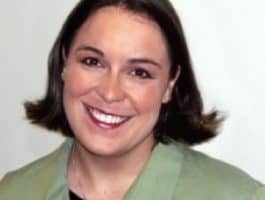
Surviving the Aftermath of Divorce
Elizabeth Marquardt, director of the Center for Marriage and Families at the Institute for American Values, and Jen Abbas, author of the book Generation Ex, tell about their experience growing up without both a mother and a father in the home.
Show Notes
About the Guest
-
Elizabeth Marquardt, director of the Center for Marriage and Families at the Institute for American Values, and Jen Abbas, author of the book Generation Ex, tell about their experience growing up without both a mother and a father in the home.
-

Elizabeth Marquardt
Elizabeth Marquardt is the director of the Center for Marriage and Families at the Institute for American Values, a nonpartisan think tank focused on children, families, and civil society. Her essays and op-ed pieces have appeared in the New York Times, Washington Post, Chicago Tribune, and elsewhere. She lives in Chicago with her husband and two children.
Jen Abbas
Jen Abbas is an adult child of divorce who has dedicated herself to discovering how children of divorce can change the patterns of their past.
Elizabeth Marquardt and Jen Abbas tell about their experience growing up without both a mother and a father in the home.
Surviving the Aftermath of Divorce
Bob: It's something that's difficult to talk about——something we don't want to acknowledge because we don't want to cause anybody any more pain than they've already experienced. But the truth is—in almost every case, when a mom and dad divorce—it's hard on the children. Here's Elizabeth Marquardt.
Elizabeth: Divorce shapes young people through their lives—how they approach the major stories of the faith and how they approach the big questions of moral and spiritual development. I think the clergy—the congregation—we adults often don't know what to do with kids on their own. We don't know what to do with kids who are from a divorced family. We don't want to offend their parents. We don't want to make the child cry. We don't know what to say—so, we just say nothing, which is the worst thing of all.
Bob: And welcome to FamilyLife Today. Thanks for joining us on the Monday edition—Monday, October 7th. Our host, of course, is the President of FamilyLife®, Dennis Rainey, and I'm Bob Lepine. We talked, last week, about the movie that had just been released—Grace Unplugged. And another movie came out this week—it’s a movie called A-C-O-D: Adult Children of Divorce.
You know, I have had occasion, in speaking, sometimes, to be in front of an audience; and I’ve asked the question: "How many of you have been impacted, at some level, by divorce?—either your parents got a divorce, siblings have had a divorce, or you are married to someone whose parents or siblings have had a divorce."
Dennis: Right.
Bob: I just asked them to raise their hand. It's the overwhelming majority of people, in any room I've ever been in, who raised their hands. This issue of divorce, in the culture, is prevalent; but the issue of children growing up in divorced homes—now, becoming adults and starting their own relationships—we're just seeing kind of the front-edge of this situation in our culture; don’t you think?
Dennis: There are about 1 million children a year, Bob, who are impacted by divorce. That's been occurring now for —well, close to three decades—and to such a degree—if you take the age group of 18 to 40—approximately 40 percent of that age group are adults who were children of divorce, growing up.
It's so prevalent—we decided to commit a series of broadcasts just to speaking, to not only the children of divorce and to individuals who get a divorce—but to every couple, who are married, to speak to the sanctity of marriage and the importance of making your marriage go the distance. I think you're going to hear, in the voice of this young lady, Charlotte, who is in her early 30s, just the drama that divorce creates—even to someone, now, later in life.
Charlotte: Of course, my mom and my dad married. They adopted my sister, and then I was born two years later. I was probably two or three, and then they divorced; but it gets a little confusing because I remember thinking—because my parents divorced when I was so young—that: “This isn't going to affect me so much. I'm going to be kind of immune to this.” Then, later on in high school and college, I thought, "Oh, boy, I was so wrong!" [Emotion in voice]
The way I remember things may not be what actually happened because, sometimes, what a parent may say and what a child hears are two different things. But what I heard was: "Your father didn't choose to take you." What I heard was: "Your father isn't paying child support." What I heard was—you know, if I was angry at my stepfather—it's: "Well, you should love him because he's paying for you." So, of course, I wasn't shielded from it at all. I was reminded of it all the time.
One of the issues that comes up in my marriage is simple little details—where my husband might tell me some little fact—but I don't believe him, and I was completely unaware of it—but after a while, it really starts to wear on the marriage. Of course, there are much deeper issues; but from where I'm looking at it, with divorce, the problems don't go away. They're simply just pressed down the generational pipeline. It seems, to me, that they tend to multiply, too.
Parents are already adults. They've got some tools that they can use—if they choose to—to work through these problems. But if they want to pass their problems back, and down, or onward—I guess I should say—generationally—to their children, these problems are going to multiply because children are far less equipped to deal with these issues when they're young. I feel like they're emotionally stunted, and they grow up emotionally stunted.
Bob: You know, as you listen to Charlotte talk about her own experience, I'm remembering how many times you've heard people say: "Well, the kids will get over it. I mean, they're resilient. They'll bounce back."
Dennis: Right.
Bob: And what we're learning is——we've got a generation of kids who are the children of divorce—and many of them aren't over it yet.
Dennis: My pastor once said in church—he said, "We've been sold the idea, by the culture, that children bounce," as you said, Bob. He said: “That's a lie. They break. They don't, necessarily, bounce back.”
Because of this issue being so prevalent in our culture today, we decided to invite a couple of guests onto our broadcast to simply discuss this and have a dialog. It's interesting that both of our guests, on today's program, are both children of divorce and have chosen to write about this, really, from two different angles.
Jen Abbas joins us from Grand Rapids, Michigan. She's a writer and a child of divorce—as I mentioned—has written a book called Generation Ex. I want to welcome you to the broadcast, Jen.
Jen: Thanks for having me.
Bob: We ought to say that that "X" is "E-X," so that nobody gets confused by that title—Generation Ex as in e-x—extracted from a family.
Dennis: No doubt about it. Elizabeth Marquardt also joins us. She is Director of the Center for Marriage and Family, which is a part of the Institute for American Values—lives near Chicago with her husband and her two young children. She's in the throes of raising a family now and appreciates, more than ever, the impact a family can have on children. She also has written a book. It's called Between Two Worlds. Elizabeth, we want to welcome you to FamilyLife Today, as well.
Elizabeth: Thank you so much.
Dennis: Jen, your parents divorced when you were 6 and at the age of 18. So, you experienced this twice.
Jen: That's correct.
Dennis: And, Elizabeth, you had a little different experience. Your parents were divorced when you were a toddler, at the age of two—and then, again, at 9—again, at 13—and yet, a fourth time at 22.
Elizabeth: Yes. It's not all that uncommon a story. The divorce rate for remarriages, as we know, is much higher than for first marriages. So, if your parents divorced when you were quite young, there's a good likelihood, unfortunately, that there will be more divorce.
Dennis: You described yourself, in the first grade, hearing a couple of moms who were talking about divorce.
Elizabeth: Yes, I was climbing on the jungle gym, outside my school. I hear one saying to another, "Kids from divorced families are kicked back and forth like a football." That image really grabbed me. I wrote about it in the book because it had always stayed in my mind because I couldn't tell what that meant.
So, I tried that out, later, with my dad. I just sort of said casually, "Yes, you know, kids from divorced families are kicked back and forth like a football." He just turned purple and looked so angry. I could tell he wasn't angry at me, but he looked angry. He kind of stuttered; and he said: "That's not true! That’s just what—that's only about kids whose parents don't love them. Your mom and I love you."
I knew that was true. I knew they loved me very much. I knew this idea of being kicked—that wasn't right because I wasn't kicked back and forth. I was received with open arms, back and forth. Yet, the idea of flying up there in the air—sort of not connected to anything, on your own, not sure where you really belong—that really resonated with me. Something about that image really stuck in my mind.
Bob: As a child—experiencing growing up in a home where there's been divorce—you kind of figure this is normal. Whatever you're growing up with—for you—is normal. So, you figure: “This is the way the world is.”
Elizabeth: Exactly.
Bob: Jen, it's not until you get to early adulthood that you start to go: "Wait! Maybe, normal isn't normal."
Jen: A lot of times, it's not until you're in college or you're out on your own, where you kind of have a chance to compare stories with other people your age. You know, for me, that's when I started really thinking, "You know, maybe, I missed out on something really, really important."
Bob: Do you remember a specific instance where you went: "You did that? That wasn't my experience."
Jen: I think, pretty much, my entire freshman year. Actually, I think the first idea was fall break—and not knowing where I was going to go. My new friends, from intact families, well, they knew they were going to Mom and Dad's. I didn't know—
Bob: They were going home.
Jen: They were going home. Because my mom and stepdad—whom I had lived with from the time I was 5 until the time I was 18—they divorced just before I graduated from high school. The house that I grew up with—with my mom and stepdad—that I had lived in for 12 years—prior to that—was already gone. There was this new house. Everyone had kind of gone away. There was no home to go home to. So, I didn't go anywhere.
Dennis: So, you didn't feel like you were being kicked back and forth.
Jen: Not as an adult. I felt like my home had disappeared, and I didn't belong anywhere.
Bob: I've heard people describe that being weightless. You feel like you're just floating.
Elizabeth: You're floating. You're kind of fragmented inside—you know—this idea of being torn between different worlds. Not sure where you really belong comes up so often when you talk to the children of divorce.
Dennis: Don't really have a place to be anchored?
Elizabeth: They have two homes, in a sense. Yet, what comes through, loud and clear, is that having two homes feels less secure than having one. There's this real sense of not fully belonging in either place. Children of divorce say they feel like insiders and outsiders in both of their own homes.
Dennis: Elizabeth, you mentioned that your parents divorced at 2, 9, 13, and 22. What's the effect of four divorces on a young lady, growing up?
Elizabeth: Constant loss is the best way I know to describe it. You know, there are a lot of good people who came through my life, as a child. Most of them I don't know anymore—stepparents, ex-stepparents, step-siblings, ex-step-siblings. You know, I have an ex-adoptive-half brother. I have no idea—I haven't seen him in 20 years.
Jen: I talk about having a family bush instead of a family tree—
Elizabeth: Because it all just goes out!
Dennis: As I was preparing for this broadcast, I set my phone down, where I charge it. My phone charger is on a table where I have my grandparents' 50th wedding anniversary cake topper. I somehow ended up with that from Oliver Theodore and Bertha Rey; alright? O.T.—as he went by—and Bertha were married for over 50 years. I can remember, as a young lad, watching them stand behind that cake. I was—I don't know—six / seven years of age—but it made an impact to see them standing behind that cake.
Now, that was on my mom's side. On my dad's side, his father deserted his mother when my dad was about 13 years of age / 14. You know, I never had a chance to talk to my dad about its impact upon him, as a boy; but it had to have an impact upon him, growing up, because he had to assume the role of caregiver in a pretty large family—taking care and providing for his mother, financially. I mean, they were dirt poor.
But here was my mom and dad—in many regards, a picture of this culture that we're growing up in today—which is a culture of divorce—where, like you, Elizabeth—you come from a broken home, and you married a man who came from an intact family. It does have an agenda on your marriage, from the start; doesn't it?
Elizabeth: It does. I'm not unusual, among a lot of children of divorce, in just resisting that—that the feeling that you have a guillotine over your marriage is just an unpleasant one. I guess we all like to think we're different somehow. I know the data very well—that children of divorce themselves have a significantly higher divorce rate when they grow up. In my own study, they did, as well.
I just put on kind of blinders when I confront that. I think it means that we need to be vigilant about our marriages, and work hard on them, and know that we can't do it alone. But I guess I also just look for reassurance in facts like—you know—if your marriage has lasted more than a few years, you've got a good chance of lasting for a lifetime.
Dennis: Is what you're expressing there more of a desire not to be a victim?
Elizabeth: It's not to be a victim and also the sense—you know, marriage is a complex, tough thing—as we know. You know, if you have any belief that: “For some reason, it's not going to work out,” that's not going to help you.
I think a lot of us would like to think that children of divorce come to marriage almost divorce-proof because we know how painful divorce is—that, you know: “We'll do anything to avoid it.” I think that could be true for some of us—but, as we know—we come to marriage, also, with a lot of patterns, and often distrust that can make a marriage a lot harder; and we have a higher divorce rate. But I think if we reach out and get help, there's a lot of hope.
Bob: Jen, you're in your 30s—single—never been married. Do you think growing up in a family where divorce was prevalent is one of the reasons why you're in your 30s and single today?
Jen: Absolutely. In my situation, my mom married young. She always told me the reason that—you know, she was glad that she married my dad because I was born and my brother was born; but it didn't work out because they'd married too young and didn't have a chance to figure out who they were. But then, she married her best friend. I kind of internalized that. I think, somewhere along the way, I kind of picked up the idea: “I don't want to get married before I'm 30 because if I get married before I'm 30, it won't work.
But then, when they divorced, it kind of threw that theory out the window. It really set me back. I think it's just taken me a little longer to change that hardwiring of what to expect out of relationships and kind of replace all the things that I've seen with what is true, and right, and noble.
Bob: Well, let's say Mr. Wonderful appeared in the studio right now; okay?
Jen: Excellent!
Bob: Would that be okay? [Laughter]
Jen: This has been a great day! Thanks, guys. [Laughter]
Dennis: She's outta here!
Bob: Let's just assume he shows up. All of a sudden, you're both smitten with one another. You think: "Where have you been all my life? I've been waiting for you." Is there any fear?
Jen: There is fear; but I'm learning that, you know, faith conquers fear and learning to, really, just talk myself through that. But I have to tell you—writing this book has not been good for my social life because they read this book and—you know, there's the marriage retreat in it and stuff. It's a little intimidating for the average guy. [Laughter]
Bob: I understand.
Dennis: Yes. I want to ask you, at this point, Elizabeth, because you did a nationwide survey. You actually went after how divorce impacts children, morally and spiritually. Elizabeth, you found—as one of your ten major findings in children of divorce—that children of divorce are much less likely to have had consistent involvement in a religious faith when growing up.
Elizabeth: That's right.
Dennis: Now, I had to say, when I read that: "Wow! Are you saying that children of divorce have more difficulty establishing a relationship with God because of that divorce?"
Elizabeth: Absolutely. Not only do they have less consistent involvement in a religious community when they're growing up, they are far less religious, on average, as adults. The grown children of divorce—these are 18- to 35-year-olds—they were about 14 percent less likely to be a member at a house of worship and, similarly, less likely to be—to say that they are very or fairly religious. Many indicators, overall, these young people are far less religious compared to their peers, who grow up with married parents. The stories they tell explain this.
You know, many of them say:"When my parents divorced, we stopped going to church. My mom…” or, “My dad…” or, “Both fell away from the church. Nobody reached out to me." One of the most poignant findings in my study is that, of those children of divorce, who were active in a faith at the time of their parents' divorce, two-thirds say that no one from the clergy or congregation reached out to them, at that time.
Dennis: I want to stop you there because that was a big "Aha!" in your book, for me, as well. You're saying that an overlooked victim of divorce are the children of divorce and that the Christian community—the community of faith—needs to cut past the parents, down to the children, and pursue them—to begin to talk to them about how they are processing it.
Elizabeth: Absolutely. We need to recognize that children of divorce—their faith journeys are impacted by their parents' divorce, throughout their lives. We're not just talking about young children—we're talking about young adults and even older. Divorce shapes young people through their lives—how they approach the major stories of the faith and how they approach the big questions of moral and spiritual development.
What came through so poignantly, as well, was how often these young people would seek out a church and a life of faith, even without either parent. It wasn't even just that they went to church, just with one parent, after the divorce; but they'd get there—however they could. So many of them told stories of walking to the neighborhood church, taking the city bus, going to church with a friend, showing up alone and being children in the pews alone.
One young woman kind of unconsciously said: "Yes. I remember going to church—you know, sitting there in the back—and the kids, who came with their parents, sat up front." My heart just broke. She had this image. I don't know that it was necessarily true—that every single Sunday the kids with the divorced parents sat in back—but in her memory, that's how it was. I think it gives some insight into how set apart and different she felt.
I think the clergy—the congregation—we adults often don't know what to do with kids, on their own. We don't know what to do with kids who are from a divorced family. We don't want to offend their parents. We don't want to make the child cry. We don't know what to say—so we just say nothing, which is the worst thing of all.
Dennis: That's exactly right. I think, because it is uncomfortable, many times, we don't engage the adults or the children, at any level. They're left, in their isolation, to deal with a problem that's one of the biggest events of a human being's existence.
Bob: Well, and you talk about this being an "Aha!" for you. I think what we've got to realize, as we talk about the subject this week, is that there are a lot of "Aha's" related to being children of divorce that don't show up on the surface. They're not something that you can walk down the street and go, "Oh, yes;" but they're there, and they're tucked away. Even the children, themselves, may not be fully aware of what's there; but it is.
Dennis: And as we started the show, there is a huge percentage of adults today who have been impacted by divorce. I want to encourage you—call a family member, call a friend—and tell them to tune in this week as we talk about children of divorce and how this impacts us throughout our adulthood.
Bob: And encourage them to get a copy, or get a copy for them, of the book that Elizabeth has written called Between Two Worlds, which is a good look—a scholarly look—at the issues that face adult children of divorce. The movie, that’s in theaters this week, may make it look like it’s all light-hearted, and funny, and everybody turns out okay in the end. But there are a lot of issues that are facing a lot of adult children of divorce.
Of course, ultimately, what resolves those issues in the human heart is the Gospel. It’s somebody understanding the transcendent reality—understanding that Jesus and His purposes are above everything else. But I think it’s helpful to understand what goes on, in the human heart, when a mom and a dad decide to divorce.
You can go to our website, FamilyLifeToday.com, to find a copy of the book Between Two Worlds by Elizabeth Marquardt. Again, go to FamilyLifeToday.com, or call 1-800-FL-TODAY to request a copy of the book. That’s 1-800-358-6329. That's 1-800-“F” as in family, “L” as in life, and then, the word, “TODAY”.
Now, we want to make sure we say, “Thank you,” to those of you who are regular and faithful supporters of FamilyLife Today. That would include our Legacy Partners—we hear from you guys each month. We so appreciate your faithfulness in supporting this ministry—helping to provide for the cost of producing and syndicating this daily radio program in all the channels where the program is heard. We also want to thank those of you who get in touch with us, from time to time, to let us know that you are standing with us in what we’re doing. We appreciate your contributions, as well.
In fact, this week, if you’re able to help with a donation to support this ministry, we’d like to send you a thank-you gift. It’s a book by Jennie Allen called Anything. It’s about the prayer that she prayed—that she says rocked her world. We’d love to send that book to you as our way of saying, “Thank you for your support of the ministry.” Go to FamilyLifeToday.com. Click on the button that says, “I CARE”, to make an online donation. Or call 1-800-FL-TODAY. You can make your donation over the phone. You can also mail a donation to us and request a copy of the book, Anything. Send your note to us at: FamilyLife Today, PO Box 7111, Little Rock, AR 72223.
Be sure to join us back again, tomorrow, when we’re going to talk again with Jen Abbas and Elizabeth Marquardt about some of the things that adult children of divorce end up feeling and experiencing—how they process the whole issue as Mom and Dad divide, after the kids are all grown-up. We’ll talk more about that tomorrow. I hope you can be with us for that.
I want to thank our engineer today, Keith Lynch, and our entire broadcast production team. On behalf of our host, Dennis Rainey, I'm Bob Lepine. We'll see you back next time for another edition of FamilyLife Today.
FamilyLife Today is a production of FamilyLife of Little Rock, Arkansas.
Help for today. Hope for tomorrow.
We are so happy to provide these transcripts to you. However, there is a cost to produce them for our website. If you’ve benefited from the broadcast transcripts, would you consider donating today to help defray the costs?
Copyright © 2013 FamilyLife. All rights reserved.
1
Episodes in this Series

Approaching Marriage


